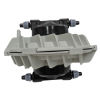Pump Diaphragm, complete (Teat Spray System)
Available
Pump Diaphragm, complete
for standard Jetstream Teat Sprayer
Suitable for use with
- Teat Spray Power Unit
Features;
- Suitable for use with the Ambic JetStream™ Teat Spray System.
- Fully vacuum operated so no electricity required.
- Easy to install and low maintenance.
- High capacity ensuring that both spray consumption and pressure are maintained when more than one gun is in use at any one time.
- Suitable for use with most chemicals – see Viton model for Chlorine Dioxide and Lactic Acid.
Important: NOT suitable for use with Sodium Hypochlorite or Peracetic Acid.
(See Viton model for Chlorine Dioxide and Lactic Acid)
Pump Head: Polypropylene
Non-Return Valves: Polypropylene and glass balls
Pump Body: Polyphenol Ether (PPE)
Diaphragm Mushroom and Spigot Set: Nylon
Pump Head Diaphragms: EPDM and bonded mild steel stud
Central Diaphragm: EPDM and welded Zinc-passivated mild steel
Blanking Plugs: Polypropylene
O’ rings: EPDM and Viton
Nuts: Nylon
Dimensions: 22 x 15 x 18 cm Net weight: 1.4 Kg
RECYCLING/DISPOSAL INFORMATION
Polypropylene Plastic (PP)
This dairy parlour product is made from Polypropylene. Polypropylene, is a thermoplastic polymer which is widely used for many applications including food containers, toiletries, plastic trays, textiles & upholstery. Polypropylene recycling has become a necessary function of the polypropylene lifecycle. Currently only about 1% of PP is recycled, the rest ends up in landfills where it slowly decomposes and can release hazardous fumes and chemicals.
Currently, plastics including PP, can easily be recycled in many kerbside programs. Please refer to your local council to find out if this service is available in your area.
Nylon
This dairy parlour product is made from Nylon which is a Synthetic fibre that doesn’t easily degrade and constitutes about 10% of the waste in the ocean. Recycling of nylon is often a complex and expensive process. Unlike other recyclable materials such as glass and metal, the nylon melts at low temperatures. Lower melting temperatures means that some microbes or bacteria and other pollutants can remain in the substance after melting. For these reasons, recycling of nylon is not a common practice as the recycling of some other waste materials such as metals, plastics and glass. Nylon is often sent to landfill when it has a value that can be unlocked through recycling.
Companies that produce substantial amounts of nylon waste can generate a significant return. Please dispose of your used plastic products responsibly by contacting your local council who will be able to advise how best to recycle your used plastic products safely.
Steel
This dairy parlour product is made of Steel. Steel products are highly durable and long-lived products.
Please dispose of your metal dairy parlour products responsibly. Your local authority or a nearby scrap dealer will be able to advise how to recycle your used metal products locally.







